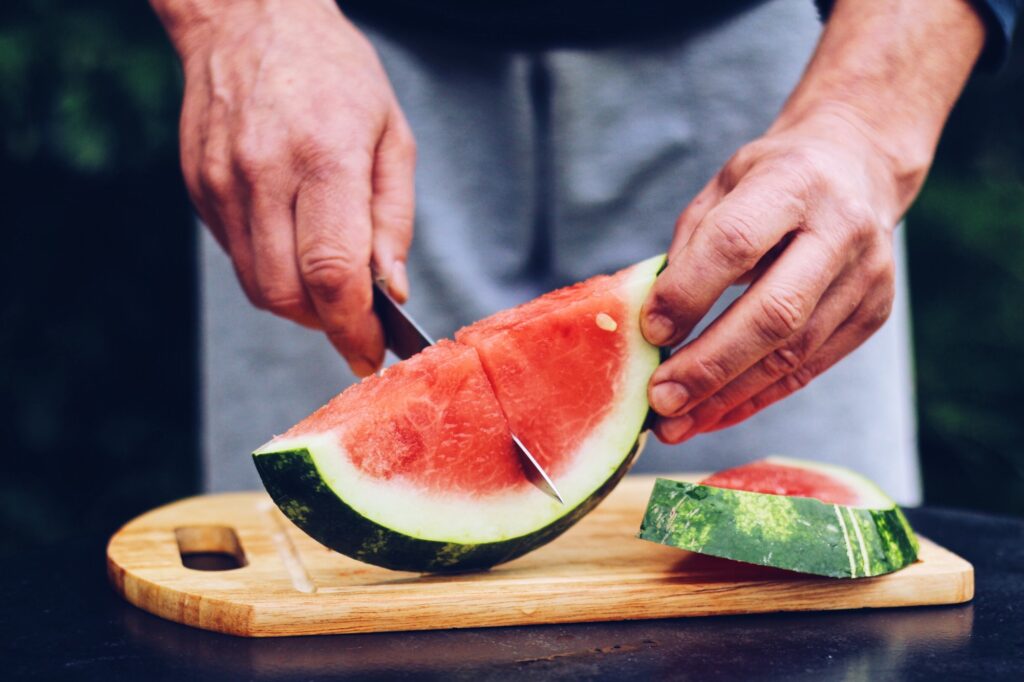Watermelon, the quintessential summer fruit, is a juicy, sweet, and hydrating treat loved by people worldwide. Beyond its refreshing taste and vibrant red flesh, watermelon boasts numerous health benefits that can enhance your overall well-being. Packed with essential vitamins, antioxidants, and hydrating properties, watermelon is more than just a snack—it’s a powerhouse of nutrients that can support various aspects of health. In this blog, we’ll delve into the health benefits of watermelon, why it should be a staple in your diet, and how it can contribute to a healthier lifestyle.
1. Watermelon is Packed with Hydration
One of the most significant benefits of watermelon is its high water content, which makes up about 92% of the fruit. This makes watermelon an excellent choice for staying hydrated, particularly during hot weather or after exercise. Proper hydration is essential for maintaining normal bodily functions, and watermelon can help replenish fluids and electrolytes lost through sweating.
Staying hydrated is crucial for:
- Regulating body temperature: Watermelon helps maintain your body’s temperature by replenishing lost fluids and preventing dehydration.
- Improving circulation: Adequate hydration supports blood flow and helps ensure that your organs and tissues get the oxygen and nutrients they need.
- Supporting digestion: Water aids in digestion, and watermelon’s water content contributes to smooth bowel movements and overall digestive health.
In addition to its water content, watermelon provides a boost of potassium, which helps regulate fluid balance and supports optimal hydration levels in the body.
2. Rich in Vitamins and Minerals
Watermelon is an excellent source of several vitamins and minerals that are vital for your health. These nutrients work together to support your immune system, improve skin health, and promote overall well-being.
- Vitamin C: Watermelon is an excellent source of vitamin C, an essential nutrient known for its antioxidant properties. Vitamin C helps protect the body from free radicals, supports immune function, and promotes healthy skin by encouraging collagen production. Just one cup of watermelon contains about 21% of your daily recommended intake of vitamin C.
- Vitamin A: The vibrant red color of watermelon is due to the presence of lycopene, a powerful antioxidant that contributes to vitamin A levels in the body. Vitamin A supports eye health, enhances immune function, and helps maintain healthy skin.
- Potassium: Potassium is a key mineral found in watermelon, which helps regulate blood pressure by balancing sodium levels in the body. Consuming foods rich in potassium like watermelon can help reduce the risk of high blood pressure, stroke, and heart disease.
- Magnesium: Watermelon also provides magnesium, which is essential for muscle function, nerve function, and maintaining a healthy heart rhythm. It also plays a role in bone health by supporting calcium absorption.
3. A Powerful Antioxidant Source
Watermelon contains various antioxidants that help combat oxidative stress and protect your body from damage caused by harmful molecules known as free radicals. Free radicals are unstable molecules that can damage cells and contribute to aging and chronic diseases like cancer and heart disease.
- Lycopene: Watermelon is one of the richest sources of lycopene, a potent antioxidant that has been extensively studied for its health benefits. Lycopene has been linked to a reduced risk of chronic diseases, including prostate cancer, heart disease, and diabetes. Studies have shown that lycopene may also help protect the skin from UV radiation, reducing the risk of sunburn and skin damage.
- Beta-Carotene: Watermelon also contains beta-carotene, a precursor to vitamin A. Beta-carotene has antioxidant properties and is known to promote skin health, support immune function, and protect against chronic diseases like cancer and cardiovascular disease.
By regularly consuming watermelon, you can increase your intake of these antioxidants, helping to protect your cells from oxidative damage and supporting overall health.
4. Supports Heart Health
Watermelon is heart-healthy due to its high levels of lycopene, citrulline, and potassium. These nutrients have been linked to improved heart function and reduced risk factors for heart disease.
- Lycopene: Studies suggest that lycopene can help lower blood pressure, reduce cholesterol levels, and improve overall cardiovascular health. Lycopene has been shown to reduce LDL (bad) cholesterol, increase HDL (good) cholesterol, and reduce the risk of atherosclerosis (the buildup of plaque in the arteries).
- Citrulline: Watermelon contains citrulline, an amino acid that can help improve blood flow by relaxing blood vessels. Citrulline is converted into arginine in the body, which helps increase nitric oxide production, a molecule that dilates blood vessels and improves circulation. This effect can help lower blood pressure and enhance exercise performance.
- Potassium: As mentioned earlier, watermelon is a good source of potassium, which plays a vital role in maintaining healthy blood pressure levels. Potassium helps counteract the effects of sodium, reducing the strain on your cardiovascular system and promoting overall heart health.
5. Aids in Digestion
Watermelon is a natural source of dietary fiber, which is essential for maintaining a healthy digestive system. While watermelon’s fiber content isn’t as high as some other fruits and vegetables, it still contributes to regular bowel movements and helps prevent constipation.
- Water content: The high water content in watermelon helps soften stool and supports smooth digestion, making it easier to pass waste. This can help prevent constipation and promote regular bowel movements.
- Fiber: The small amount of fiber found in watermelon helps support healthy gut function by feeding beneficial gut bacteria. A healthy gut microbiome is essential for digestive health, immunity, and even mental well-being.
Watermelon’s hydrating properties make it particularly effective in preventing digestive discomfort, such as bloating and indigestion, especially when consumed during or after meals.
6. May Improve Skin Health
Watermelon’s combination of vitamins, antioxidants, and water makes it an excellent fruit for maintaining healthy skin. Regular consumption of watermelon can help hydrate the skin, reduce signs of aging, and promote a glowing complexion.
- Hydration: Hydrated skin is healthy skin. The high water content in watermelon helps keep your skin moisturized from the inside out, preventing dryness, flakiness, and irritation.
- Lycopene: Lycopene’s antioxidant properties can help protect the skin from the harmful effects of UV radiation. Research suggests that lycopene may help reduce the risk of sunburn and skin damage caused by exposure to the sun’s harmful rays. By consuming watermelon regularly, you may be able to enhance your skin’s natural defense against UV damage.
- Vitamin C: Vitamin C is essential for collagen production, which is a protein that helps keep your skin firm and elastic. Collagen plays a vital role in preventing wrinkles and fine lines, making vitamin C a key nutrient for anti-aging. Watermelon’s vitamin C content can support the production of collagen and promote youthful-looking skin.
7. Promotes Muscle Recovery
Watermelon can be a great post-workout snack due to its combination of water, carbohydrates, and electrolytes, all of which help with muscle recovery. After a workout, your body needs to replenish the fluids and nutrients lost through sweat. Watermelon is an excellent way to do this.
- Water and electrolytes: The high water content in watermelon helps rehydrate the body, while potassium and magnesium support muscle function and recovery. These electrolytes are essential for preventing muscle cramps and promoting muscle relaxation after exercise.
- Citrulline: Citrulline, an amino acid found in watermelon, may also enhance exercise performance and recovery. Research suggests that citrulline supplementation can help reduce muscle soreness and improve endurance, making watermelon a great natural option for athletes.
8. Weight Loss Benefits
Watermelon can be an excellent addition to a weight loss plan due to its low calorie content and high water content. It is filling, hydrating, and low in calories, which makes it a perfect snack for those looking to control their calorie intake.
- Low-calorie, high-volume: One cup of watermelon contains only about 45 calories, making it a low-calorie option that can satisfy your sweet cravings without derailing your diet. The high water content also adds volume to the fruit, helping you feel full and satisfied without consuming many calories.
- Natural sweetness: Watermelon’s natural sweetness provides a healthy alternative to sugary snacks and desserts. By swapping high-calorie, sugary snacks with watermelon, you can satisfy your sweet tooth without adding excess calories to your diet.
Conclusion
Watermelon is more than just a refreshing summer treat—it’s a nutritional powerhouse that offers a wide range of health benefits. Whether you’re looking to stay hydrated, boost your heart health, support digestion, or improve your skin’s appearance, watermelon can help. Its rich combination of vitamins, antioxidants, and hydrating properties makes it an excellent addition to a balanced diet. So the next time you bite into a juicy slice of watermelon, remember that you’re not just enjoying a delicious fruit—you’re nourishing your body with nature’s goodness.























